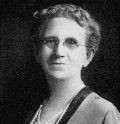Rhus had dry, rough tongue with red edges and tip. Apis a dry tongue shiny, cracked and sore with little or no thirst. Rhus had great thirst for cold water or milk. Apis had a bruised sore feeling of the abdominal wall with excessive tenderness felt on least pressure. Rhus had tearing pains down the thighs with necessity of changing position for relief. The Rhus child had restless sleep, troublesome vivid dreams of hard work and difficulties, while the Apis baby lay in a stupor which was occasionally interrupted by shrill sharp screams. Rhus and Apis took care of the children so well that each recovered.
Rhus had taken cold. He had been out in the rain three or four days before and remained wet for several hours. As a result, there appeared oppression of the chest, restlessness at night, acute pain in the chest, couldn’t take a deep breath, respiration was hurried, very short at night, dry teasing cough with tearing pain in the chest. Apis had a cold at the same time. He had a dry spasmodic cough morning and evening, worse at night. Deep inhalations started the cough. Rhus chuckled to himself that for once Apis hadn’t succeeded very well in his imitation.
Rhus spent a day in the park, and one morning two or three days afterwards, he awoke to find his face and hands red and swollen and covered with vesicles filled with clear yellow watery liquid. The vesicles coalesced into blisters. When the blisters broke and the fluid touched the skin, new vesicles formed. The burning and itching was intense; any touch caused the itching which rubbing ameliorated a little during the rubbing, but caused the eruption to spread as it was almost impossible to rub much without breaking the blisters. After the rubbing, the burning and itching became almost maddening. The application of hot water caused first an aggravation, then an amelioration. Rhus thought at last he had something that Apis could not imitate as Apis had not been among poison, but there was Apis covered with red spots which were covered with mall vesicles which exuded moisture. The itching, stinging and burning were intolerable. Apis scratched until it bled. The eruption was worse from the slightest breath of air, but was equally sensitive to the warmth of the room or bed. Apis didn’t often have such an eruption. He was more likely to have urticaria like bee strings. Small white spots with red areolae, itching violently, worse at night or it would come in isolated elevations, painful and tender to touch, assuming a purplish or livid color, but for once as Rhus said, just to imitate him, Apis had the vesicular eruption on an inflamed base. Rhus sometimes had urticaria, but it was brought on by getting wet; then Apis wanted to know whose imitation that was.
Apis had a nervous irritability greater than that of Rhus. Apis was restless at night from nervousness. So was Rhus, but Rhus was more to be restless from pain. Apis had great weakness in all his limbs and wanted to lie down; so had Rhus. Apis was sleepy in the morning, you could hardly waken him, his sleep was so heavy. Rhus was sleepy after eating. Apis had a general aggravation in the evening. Rhus had a particular aggravation in the evening and Apis in the morning. Both were worse at night. Apis was better in the cool open air. Rhus was better in the warmth air. As Apis was worse from motion, Rhus was better from continued motion.
Apis was made sick by mental emotions, severe mental shock, punctured wounds, dissecting wounds, suppressed eruptions. Rhus was made sick from suddenly checked perspirations, damp weather, overstrained muscles, and from getting wet.
The Apis family were subject to effusions. They had effusions of the arachnoid, of the pericardium, of the pleura, of the peritoneum, and cellular tissues. No matter what diseases they had, dropsy seemed to develop. They had dropsy after scarlet fever, dropsy with chronic rheumatism, with angina pectoris, with marasmus. The women of the family had dropsy during pregnancy, puerperal convulsions, prolapsus uteri, amenorrhoea, and cancer of mammae.
Rhus looked out one day and saw his neighbor Apis sitting on the porch in a chair, swollen from the crown of his head to the soles of his feet. There was dropsy everywhere, his arms, abdomen, feet, legs, had all been attacked. The skin had burst on the legs in several places and water was oozing from them. it was impossible for him to lie down. Rhus remembered the time when he too had dropsy, but he was so bad that he was obliged to stay in the house propped up in bed. “Apis certainly couldn’t be very ill if he could be out in the open air.” Unfortunately for rhus’ prognosis, Apis had an organic heart and compensation had given out, so all that could be done for Apis was to relieve his sufferings while he lived and give him euthanasy.
Rhus did not long survive him; for some unexplained reason, smallpox developed. The eruptions turned livid, there was burning fever, burning thirst, lips and teeth covered with tenacious brown mucus suppressed urine, diarrhoea with dark bloody stool and great prostration. For once Rhus has followed Apis and no one knows if they agree.

